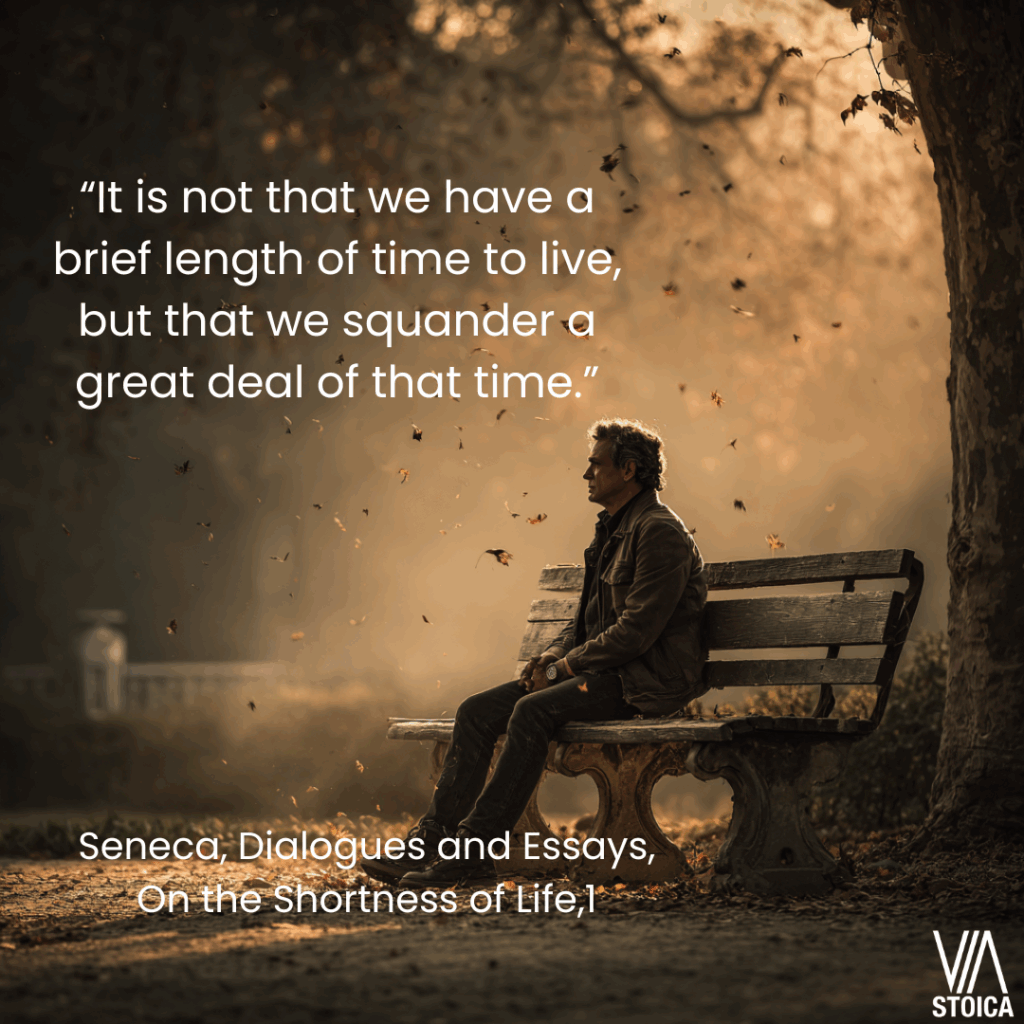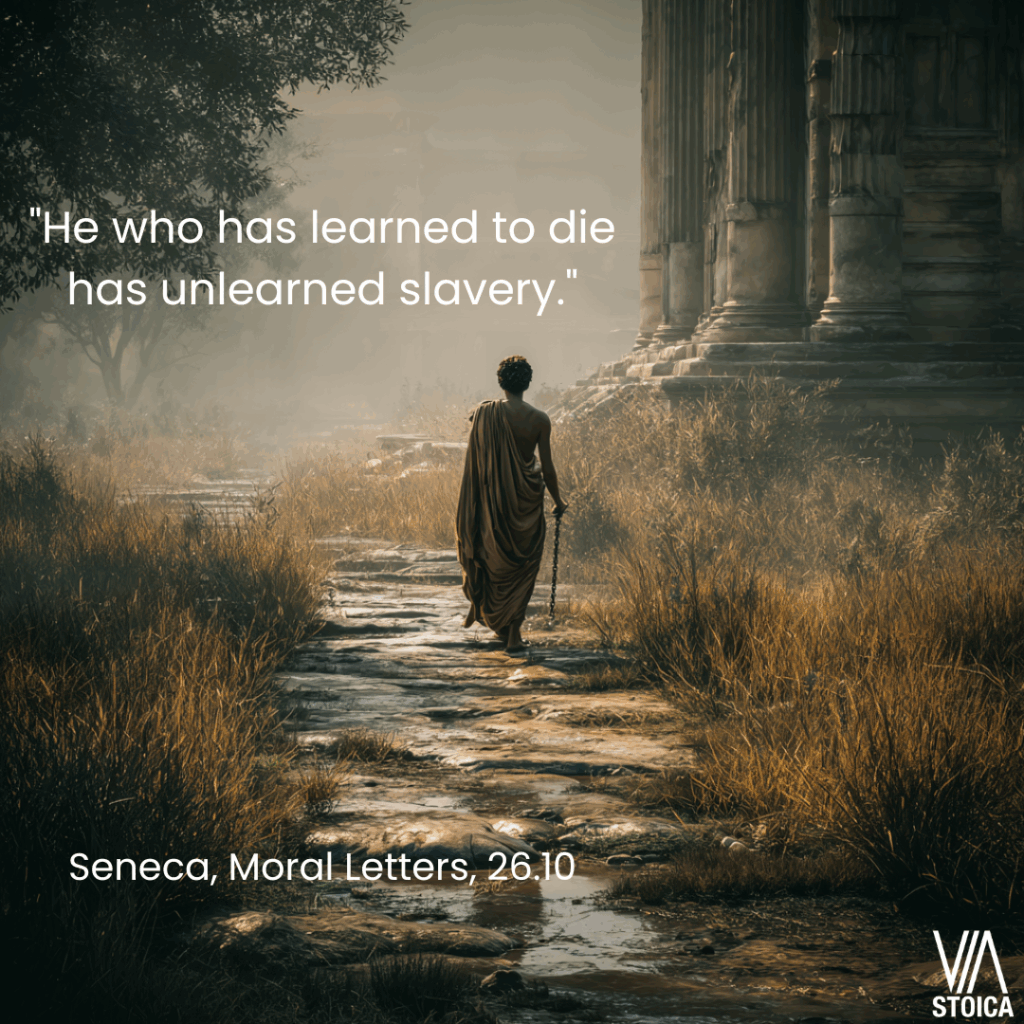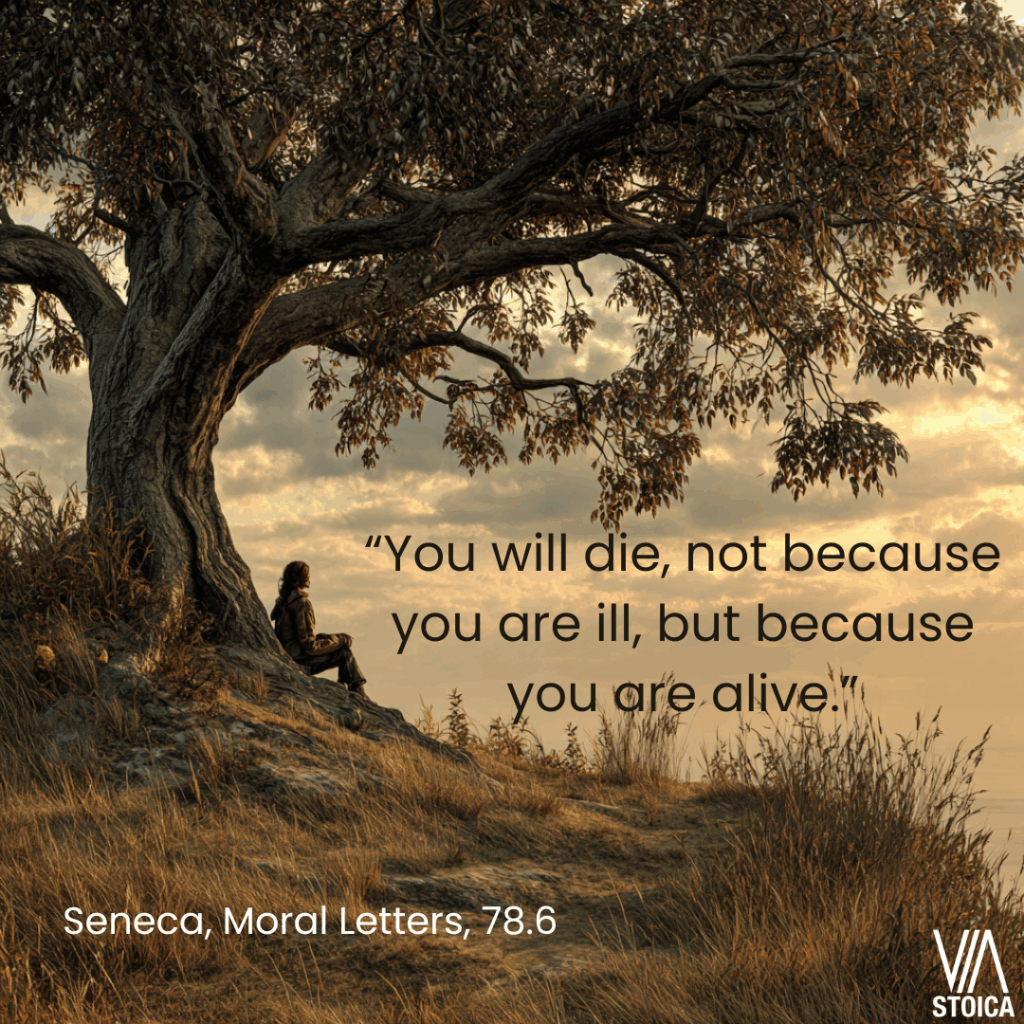10 Seneca Quotes on Death: How to Live Better Knowing You Will Die

Death is not a subject most people want to talk about. But for the Stoics, especially Seneca, reflecting on mortality was not dark or depressing; it was essential. Facing the reality of death is not only about learning how to die. It’s more about learning how to live.
In this post, we explore 10 powerful quotes from Seneca on death, each with a reflection and a practical takeaway. By the end, you’ll have not only a deeper understanding of how the Stoics viewed death, but also tools to bring more urgency, clarity, and peace into your life.
1. Accept the Inevitability
“It is not that we have a brief length of time to live, but that we squander a great deal of that time.”
Seneca, Dialogues and Essays, On the Shortness of Life,1
Reflection: Seneca reminds us that we waste a lot of our lives and the time we have, which makes it seem that our lives are too short. This tends to turn death into something scary because it means that our time will be up at one point. And if we haven’t spent our time well, then this end might come too soon. By living well and focusing on the present, we can appreciate it for what it is when it is happening. This will make letting go of life easier because we will know that we have lived it well.
Practice: Start paying attention to your actions in the moment. Pause for a moment and reflect on what you are doing right now. Are you distracted, or are you where you are supposed to be?
2. Let Death Be Your Teacher
“Let us so order our minds as if we had come to the very end. Let us postpone nothing.”
Seneca, Moral Letters, 101.7
Reflection: We don’t know when death will meet us. That’s why Seneca asks us to tell our minds that the end is right here. We might not wake up tomorrow, or we may be about to breathe our last breath. Seneca implores us then to act now, don’t delay what you should be doing. There might not be another moment to do it.
Practice: Begin your day with the question: “If this were my final day, what would I have to do?”
3. Death Is a Part of Nature
“We do not fear death; we fear the thought of death. For death itself is always the same distance from us.”
Seneca, Moral Letters, 30.17
Check out our article on Why Death Needs a Rebranding
Reflection:
Seneca tells us that death isn’t a distant threat; it’s always one moment away. The problem isn’t death itself, but how we think about it. Because we don’t know when it is going to happen and how, it has a grip on us. We want to know and have certainty, but Fate will not give it to us. By treating death as ever-present, we stop being anxious about it, and we can start living in freedom.
Practice:
What is it that you fear about death? Is it the fact that it is going to happen, or that you don’t know when and how it will happen? Reflect on the origin of the fear and learn to have a better relationship with the inevitable end.
4. Measure Life by Depth, Not Length
“Life is long, if only you knew how to use it.”
Seneca, Dialogues, On the Shortness of Life, 2
Reflection: Most people who fear death and who are unable to let go of life are those who feel they have unfinished business and have wasted their time. But if you can live with gratitude and attention, then every moment can be lived as a full life. Stop being afraid of death and start living your life.
Practice: Identify one area of life you’ve been postponing starting or continuing. This week, take one bold, clear step forward to action.
5. Philosophy Is Preparation for Death
“He who has learned to die has unlearned slavery.”
Seneca, Moral Letters, 26.10
Reflection: Freedom begins when fear ends. And fear ends when death no longer controls us. For Seneca and for most thinkers, philosophy is a way to learn how to die. When you make progress toward this goal, you’ll be able to release the shackles of this master called death.

Practice: Spend five minutes imagining the end of your life, not to dwell in fear, but to think about what this means for you and why you fear it.
Continue with the rest of the 10 Seneca quotes on Death
6. Fear of Death Is a Bigger Problem Than Death Itself
“What is death? It is either the end, or a process of change. I have no fear of ceasing to exist; it is the same as not having begun.”
Seneca, Moral Letters, 65.24
Reflection: The best way to deal with something you fear is to try to understand it. Seneca asks a simple question: What is death? This is where the process of knowledge starts. Is it the end, or something that changes? The Stoics look at the time after death as being the same as before we were born. I didn’t exist then, and that wasn’t a bad thing. If change, then I’ll remain part of the Logos.
Practice: Whenever anxiety about the future arises, ask: “Am I afraid of the thing itself, or of not understanding it?”
7. Death Gives Value to Life
“Life, it is thanks to death that you are precious in my eyes.”
Seneca, Dialogues and Essays, Consolation to Marcia, 20
Reflection: Seneca doesn’t just accept death; he understands its value. Death is what makes life unique, beautiful, and meaningful. Without an ending, there would be no reason to treasure each moment.
Practice: Next time you feel stuck or dull, remind yourself: this won’t last forever. Reflect on the uniqueness of being alive and conscious of it. Whatever the problem is you’re facing, it will go away. Be grateful that you get to experience life.
8. Don’t Die Before You Die
“He who does not wish to die cannot have wished to live. For life is granted to us with the reservation that we shall die; to this end our path leads.”
Seneca, Moral Letters, 30.10
Reflection:
To reject death is to reject life itself. In number eight of the 10 Seneca quotes on death, he reminds us that mortality isn’t a mistake; it’s part of the design. Accepting death makes us more willing to embrace life. It is the natural order of things, and the Stoics require us to live in accordance with reason and logic, and thus with death in mind.
Practice:
Reflect on this: If you had infinite time, what would you stop doing? Now act as if time is limited, because it is.
9. Death Is Not an Evil
“We do not suddenly fall on death, but advance towards it by slight degrees; we die every day.”
Seneca, Moral Letters, 24.20
Reflection:
Seneca reframes death as a process, not an event. Every day that passes is a step in that journey. When we see it this way, death becomes familiar, not something to be feared, but to be acknowledged.
Practice:
Pause at the end of the day and ask: How did I live today? Use that reflection to shape tomorrow with more presence.
10. The Goal Is Peace, Not Immortality
“You will die, not because you are ill, but because you are alive.”
Seneca, Moral Letters, 78.6
Reflection:
The moment we came to life, we were destined to do. Accidents, illnesses, or old age are merely the way it happens, but it will happen. Seneca reminds us that the problem is not death, it’s our resistance to its inevitability. We seek cures, hacks, and extensions, but forget that the goal of philosophy is not to live forever, but to live wisely and to let go with peace when the time comes. We cannot save a life; we can only prolong it. But we can save our souls and characters to live as best as we can.
Practice:
Instead of chasing more time, chase more purpose. Ask yourself: What would I do differently today if I were aiming for peace and meaning, not immortality?

Conclusion
These 10 Seneca quotes on death aren’t here to frighten us. He wrote about it to free us from fear, from distraction, from wasted time. When we make peace with death, we can embrace life.
Journaling Prompt: What would you stop doing if you truly accepted that your time is limited?
Stoic Challenge: For the next 7 days, begin each morning by remembering that you are mortal, and let that guide how you spend your time.
Want to Learn more?
Book a free consultation with one of our Stoic Coaches to get support. Or read more quotes on our Seneca Quotes page. Listen to the Via Stoica Podcast on Spotify, Apple Podcasts, or YouTube.
Author Bio
Benny Voncken is the co-founder of Via Stoica, where he helps people apply Stoic philosophy to modern life. He is a Stoic coach, writer, and podcast host of The Via Stoica Podcast. With almost a decade of teaching experience and daily Stoic practice, Benny creates resources, workshops, and reflections that make ancient wisdom practical today.
Related Posts
-
 Greek Stoic Philosophy Terms
Greek Stoic Philosophy TermsWhat Is Pronoia? The Stoic Idea of Order Without Personal Favor
What Is Pronoia? Pronoia in Stoicism is the rational and benevolent order of the cosmos.It describes the idea that reality unfolds according to reason rather than chance, and that this order is good in its structure, even when individual events are difficult. In modern life, pronoia is key because it reframes how we relate to […]
Read more -
 Via Stoica Podcast
Via Stoica PodcastHow to Start the New Year: Reflection Without Regrets, Progress Without Pressure
How to start the new year For many people, the new year does not begin with purpose, but with pressure.The calendar turns, expectations rise, and reflection quietly becomes self-judgment. When people ask how to start the new year, they are often not looking for motivation. They are looking for reassurance. Reassurance that they are not […]
Read more -
 Blog
BlogHow to Stop Emotional Reactivity, Learn to Pause Before You React
How to stop emotional reactivity begins with learning to pause. Stoicism teaches that peace of mind comes not from controlling life, but from mastering our judgments about it.
Read more


Comments 0